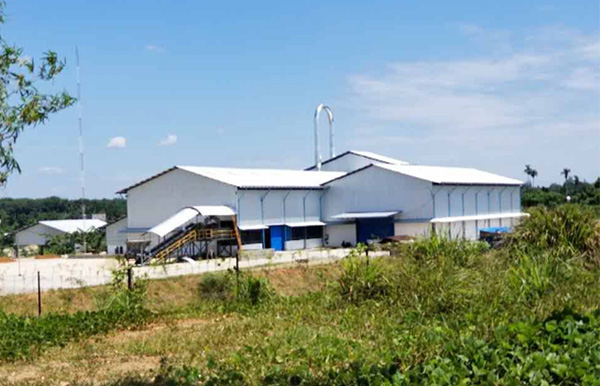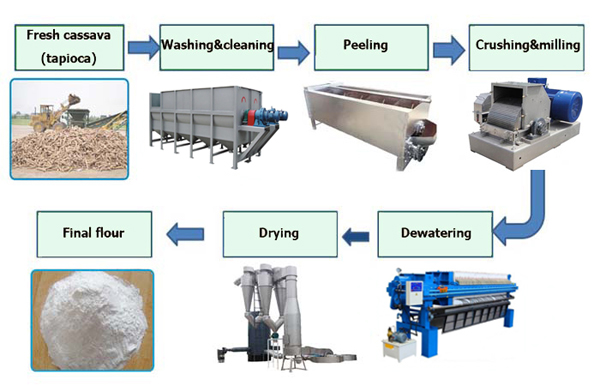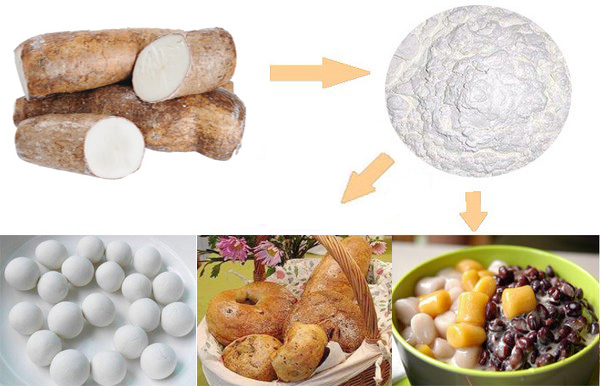Cassava flour processing in Nigeria
As the largest cassava production capacity country, Nigeria annual cassava production capacity more than 40 million tons. The rain and heat resources are abundant, and the hydrothermal conditions are well matched, which is very conducive to the growth of cassava. Experts pointed out that cassava can be grown on 95% of Nigeria's land. Nigerian farmers have a long history of growing cassava, 80% of the population is related to the cassava industry, and the planting technology is relatively mature and experienced.
Before, although the total production of cassava in Nigeria is large, the yield of cassava is still low in the world. The harvested area of cassava in Nigeria is higher than that in the whole of Asia. However, due to low yield, the country's cassava production is still lower than that of Asia. However, in the last ten years, the cultivation technology of cassava has been continuously improved, and the yield level of cassava has been greatly improved. On the other hand, Nigeria is also promoting the development of cassava processing industry, especially cassava flour processing in Nigeria, because cassava flour can be eaten as a daily staple food. Once the output of cassava flour has been greatly improved, Nigeria's import of food can be greatly reduced. Conducive to Nigeria's economic development and reduce dependence on foreign food imports. That's why cassava flour processing in Nigeria is so important.

Cassava flour processing plant in Nigeria
In order to promote cassava consumption, and cassava flour processing in Nigeria, the Nigerian federal government issued a policy of “bread ingredients must include 10% tapioca flour”, which was implemented in January 2005. According to local media reports, the Nigerian Minister of Agriculture and Rural Development said that in order to encourage the production and consumption of cassava bread, Nigeria will increase the tax on imported wheat and ban the import of cassava flour in fiscal 2012, and will require all bread manufacturers from March 2012. Replace high-quality tapioca powder with 40% wheat flour within 18 months of the start.
In addition, for high quality cassava flour processing in Nigeria, its preferential policies include: high-quality cassava bread producers will enjoy 12% tax benefits from 2012; all machinery and equipment used for processing cassava flour and synthetic powder will be tax-free. It is reported that in order to guarantee the supply of tapioca powder, the Nigerian government is currently cooperating with the private sector and plans to build 12 high-quality cassava processing plants in 2012 with a designed daily processing capacity of 240 tons.

Cassava flour processing machine and production process
A cassava processing plant with an annual output of 72,000 tons of high quality tapioca flour has been established in Akwa Ibom, Nigeria. The processing plant is expected to use 300,000 tons of cassava root per year, which has become the main cassava flour processing plant in Nigeria, aimed to respond the growing market demand. By the way, for cassava flour processing in Nigeria, the cassava flour milling process contain: cassava cleaning and washing, cassava crushing, dewatering, cassava flour drying, sieving and packing. Below photo is main DOING cassava flour processing machines:
The Nigerian Minister of Agriculture and Rural Development stated that Nigeria is currently the world's largest producer of cassava, while Akwa Ibom has the largest cassava production base. Therefore, the Nigerian federal government decided to maintain its leading edge and continue to lead the world's largest cassava processing country.

Cassava flour uses as food
In particular, he pointed out: "We want to process cassava into high-quality tapioca and flour, so that we can replace some imported wheat. We have land, cheap labor, abundant sunshine, and the corresponding consumer population. Therefore, Nigeria does not have reason to import food, it should Achieve self-sufficiency.
According to Nigerian media reports, the Nigerian federal government cooperated with Ghana to produce tapioca powder in Abuja on March 28. The main content of the cooperation is to train technical workers in Ghana to produce high quality tapioca flour and syrup from cassava. The main purpose of the cooperation is to satisfy 10% high quality tapioca flour or syrup in bread and candy.
The Nigerian government is working hard to develop scale production of cassava and to develop supply chains for roads, energy, water and service terminals. Nigeria is currently the world's largest producer of cassava, with an annual production of about 40 million tons. Nigeria needs to increase its processing capacity to cope with the growing global market demand. Doing Company as a professional cassava processing machine manufacturer, wil keep an eye on cassava flour processing in Nigeria.






